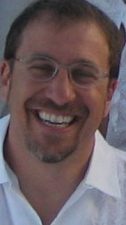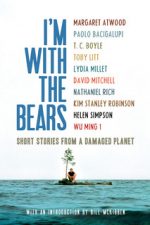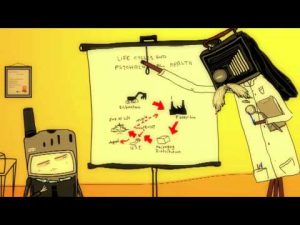 Of the many non-fiction, environmentally-themed books I’ve read over the past few years, those that stand out are Alanna Mitchell’s ‘Dancing at the Dead Sea’ and ‘Seasick‘, both of which I have reviewed for Green Prophet.
Of the many non-fiction, environmentally-themed books I’ve read over the past few years, those that stand out are Alanna Mitchell’s ‘Dancing at the Dead Sea’ and ‘Seasick‘, both of which I have reviewed for Green Prophet.
Mitchell is an acclaimed Canadian writer, skilled in her clear evocation of the destruction of the environment she witnesses around the world, and her unpicking of the scientific reports and data from scientists who are at the coalface of our changing planet.
In this exclusive interview, Alanna Mitchell explains some of her motivation, and shares insight into her exploration:
GP: In both ‘Dancing at the Dead Sea’ and ‘Seasick’ you describe many ecological disasters around the world, on land and at sea. How do you remain optimistic in the face of this?
AM: The ecological disasters are terrible; that part is clear. And we know that human actions are causing the disasters. So my hope lies in my knowledge that we are a profoundly moral species and we are capable of making things better. I choose to hope.
GP: I felt moved while reading about what was going on for you in both these books – in ‘Dancing’ it was the story of your marital break-up and move to Oxford in the UK which became the impetus and then the background, and in ‘Seasick’ it was your fear of water (since near-drowning as a toddler) and efforts to overcome this paralysing fear which became compelling. Both these personal stories co-exist alongside the gritty investigative journalism that has you in boats, submersibles, and wading through forests to uncover the truth about human impact on the environment.
Tell us a bit about your background as a journalist, and the impetus to write both these books.
AM: I cut my teeth as a journalist reporting about complex equity and debt deals with The Financial Post. And while that fascinated me, after three years I felt that I wanted to write about other things people were doing. That led me to spend 14 years at Canada’s national newspaper, The Globe and Mail, where I became immersed in social statistics that show us the big picture of how people are acting as a society. Eventually, I was posted as a correspondent to Alberta for the paper, where I discovered science issues. After that, I was hooked, and have been writing about science and society ever since.
Dancing at the Dead Sea stemmed straight from a batch of writing I did for The Globe and Mail and from a term of study I did in 2002 at what is now the Reuters Institute for the Study of Journalism at Oxford University. And I was right at the end of writing Dancing when I realized that I had looked around me to changes on land, and up to changes in the atmosphere but had failed to look down into the sea. It took every ounce of courage I had to face my own demons of the deeps and begin the ocean research. But I did it because I needed to understand the biological significance of the ocean.
GP: Which places and which situations, of the many researchers and local activists you’ve met, stay with you the most?
AM: It’s the children. I can’t forget the starving children of Madagascar, living on the edge of survival as their forest vanishes tree by tree. Then there were Inuvialuit children of Canada’s high Arctic whose way of life will be gone before they are teenagers. Or the children of the Trio tribe of Suriname, living in that glorious intact Amazonian jungle that somehow has not been cut down like so much of the rest of the jungle in that part of the world. I think, too, of the women of Zanzibar, driven by the patterns of the moon rather than the sun, who are struggling so hard to keep their children fed even as they are prevented by custom from fishing, and as the fish vanish. Those women are farming shellfish – very efficiently – and are using the food from the shellfish to feed their families. But so many other Zanzibari women don’t have that opportunity right now.
Video talk with Alanna about on her book, Seasick:
GP: Are your books, and journalism and speaking events, and all the media focus on the state of the planet (including greenprophet.com) having an impact? Are we as a species waking up to the impact we have?
AM: I think the fact that there’s so much backlash right now against the science means that the general public has been taking the science very seriously indeed. It’s taken a huge amount of money, time and cynicism to conduct the attack on science that’s taken place over the past six months.
So we explainers of the science must have been doing something right. And yes, the public certainty on the science has wobbled a bit, but I think the impact of planetary crisis is already so clear that people will soon see with their own eyes the urgency of acting. I mean, the Great Barrier Reef is likely to be gone in 20 years from ocean acidification, ocean warming and the general destabilization of ocean life. We really don’t have the luxury of time.
GP: You were recently in Copenhagen for the COP15 talks. What’s your view on how they ended, and where do we go from here?
AM: To me, the failure at Copenhagen means that we have to work harder than ever at democratizing this very robust body of research scientists have uncovered on the faltering state of the planet’s life-support systems. Most citizens don’t know where to go to get correct, peer-reviewed scientific information and they often can’t read it when they do get it. It’s up to translators of the science to let the public know how very, very compelling a story of disaster the science is telling us.
GP: What are the small steps everyone can do to make a difference to our shared habitat? What are the priorities?
AM: The only priority is lowering the concentration of carbon dioxide in the atmosphere. That’s not just lowering the rate of emissions, but lowering the actual concentration. But as to how to do that? I would never dream of limiting your readers’ imaginations by giving them a checklist!! I know that every single one of your readers has a hundred great ideas about what they can do. I invite them to dig deep into their own gifts as human beings and dream big and then get going. Together, we really can avert disaster.
GP: What are you working on right now?
AM: Lots more science research on ocean acidification, as well as a book on how the human brain learns. That’s because all of these planetary problems are really only problems of human behaviour, and I want to understand us better.



